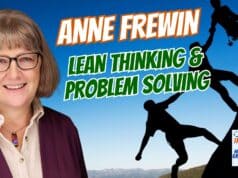Episode #24 of the LeanBlog Podcast is the 2nd part of my recent conversation with Jim Womack, of the Lean Enterprise Institute. In this episode, we talk about the state of the auto industry, from the time of The Machine That Changed the World through today.
Who does Jim think is in the best shape among the “Detroit Three?” Jim also answers some questions from Lean Blog readers.
Jim shared candid thoughts on how GM's legacy costs weighed down the company, why Ford's culture was broken at its core, and how Toyota's ambitious expansion was straining its management system. He also touched on the importance of product development speed, the dangers of “making the numbers” over solving problems, and the role of leadership in defining purpose and direction for organizations in transition.
We closed the conversation with questions from listeners, including one about the term “Lean” itself. Jim explained the story of how his MIT team coined the word in 1987, why it was chosen, and why it has always been “problematic.” His reminder remains powerful: Lean was never about cutting people–it was about creating more value with less of everything.
Click here for the main LeanBlog Podcast page with all previous episodes.
Summary on the Origins of the Word ‘Lean'
Read more here:
Key Quotes
“If GM management had tried to lose one percentage point of market share a year, they couldn't have done it as well as they actually did.”
“GM's biggest problem wasn't factory performance–it was the legacy costs that management never solved.”
“Two out of four isn't a passing score–that was the Taurus story.”
“Ford's culture became one where appearances mattered more than realities–that was the tragedy.”
“Toyota treats car parts better than most healthcare systems treat patients–and it treats employees better than healthcare treats staff.”
Automated Transcript
Mark Graban:
Hi, this is Mark Graban from the Lean Blog. This is episode number 24 of the Lean Blog Podcast for May 6, 2007. Today we have part two of a recent discussion with Jim Womack from the Lean Enterprise Institute. We turn our focus to the current state of the auto industry, and Jim answers some of your questions that came in from Lean Blog readers.
So speaking of Detroit–since The Machine That Changed the World looked at Asia, North America, and Europe–let's compare Toyota, GM, and Ford. I found a 1990 Ward's AutoWorld review of the book where you were quoted as saying GM could stick with mass production for 40 years if it wanted to, but it would keep shrinking. Looking back now, that seems to describe what actually happened. Was that really a prediction?
Jim Womack:
I was not very hopeful about GM at the time. We had some brief hopes for Ford–because they had learned a lot from their stake in Mazda, and Mazda in turn had learned from Toyota. Mazda had a real crisis in the 1970s when the Wankel rotary engine collapsed. They had to compete as just another car company, so they decided to copy Toyota.
There's a great book by Hino, The Toyota Mind, that explains this. It's not an easy read–you have to go through it a few times–but Hino, a Mazda engineer for 30 years, tried hard to understand Toyota. So Ford, through Mazda, was learning third-hand. By the late 1980s, it looked like Ford was making progress in the factories, while GM hadn't learned much at all.
So yes, I was discouraged about GM–and I was right. Ford turned out worse than we expected, so we were too optimistic about them. GM, meanwhile, just kept declining. If GM management had sat down in 1979 and said, “Let's lose exactly one percentage point of market share each year until we collapse,” it would have been hard to manage that deliberately. Yet that's exactly what happened. It's amazing–you get paid all that money, and the ship just keeps going glub-glub-glub.
Mark Graban:
Speaking of Ford, the Ward's review also talked about the Atlanta plant, then considered the most efficient Big Three facility. But that plant closed in 2006. Is that a case where they focused too much on factory efficiency instead of designing cars people wanted to buy?
Jim Womack:
Yes, that's a sad story of everything gone wrong. In The Machine That Changed the World, we originally wanted to use the Taurus example, because even the “success story” showed big flaws. To make a successful product, you need to develop it quickly, give customers what they want, minimize engineering hours, and make it inherently manufacturable.
The first Taurus took seven years–Toyota was doing it in three. It required huge engineering effort. The product hit the market well, and it was easier to assemble than GM's cars. So we said: “Two out of four isn't a passing grade.” Later, they even lost that customer connection. They went off into silly design themes–like the infamous “oval” motif that nobody wanted.
Meanwhile, Detroit shifted investments away from cars to SUVs and pickups. So Ford Atlanta had a highly efficient plant, but it was building a car the public didn't want. That's why it closed.
And politically, it's interesting: the Big Three circled the wagons around Michigan and Ohio, closing plants elsewhere. Their footprint shrank even as Toyota built one plant per state, picking up two U.S. senators with each location. Toyota was expanding political influence while Detroit was shrinking it.
Mark Graban:
The BBC recently contrasted Toyota Georgetown–where workers pull the andon cord 2,000 times a week–with Ford Dearborn Truck, where it was pulled twice a week. They said it reflected a legacy of mistrust between workers and managers.
Jim Womack:
Yes. Michigan Truck was depressing to see. The body language was terrible. Workers had come over from the Mustang plant, and it felt like the 1990s all over again.
Now, Ford's plants overall aren't bad. If it were just a factory-versus-factory competition, Detroit would be okay. They've learned some lessons. The problem is deeper: product development, purchasing, and management attitude. Managers weren't pulling the andon cord–they were “making the numbers” and covering up problems.
Alan Mulally told the Wall Street Journal that at his first Ford executive meeting, everyone was lying. That matched my experience: too clever by half, very cynical. One senior Ford executive once told me, “That poor guy doesn't understand–he thinks Ford is a public company. In reality it's a family company, and I know how to play the family.” He played it all the way to the top without achieving anything. That's Ford: who you know, not what you know.
GM, in that sense, was better. Today, GM's biggest issue is legacy costs. If they solved that, they could float. Ford's problem is weak management. Chrysler, meanwhile, had a hot streak in product, but when consumer tastes shifted, they had no backup.
Mark Graban:
And the UAW contracts and health care burdens play into that too.
Jim Womack:
Yes. GM's problem is legacy costs. Ford and Chrysler's problem is management. Health care reform might help GM someday, but that's years away. GM is better than it looks–though not as good as it should be. Ford and Chrysler have been worse than they looked.
Mark Graban:
We also had reader questions about Lean more broadly. One was: what publicly traded companies, besides Toyota, have the deepest Lean systems?
Jim Womack:
Danaher is the classic example. They staked their future on emulating Toyota. If you'd invested in them 25 years ago, you'd have outperformed GE or almost anyone else. They're secretive–I was even banned from visiting–but their results speak for themselves.
GE is another to watch. Historically they were great at acquisitions, not at Lean. But now they're trying to adopt it. We'll see if they can.
Otherwise, examples are scarce. We're studying a few large organizations at LEI, but most of the world is still stuck in mass-production management: bosses with all the answers, employees gaming the scoreboard, a Dilbert culture. Toyota's influence is still modest compared to the size of the world.
Mark Graban:
Another reader asked about the word “Lean.” Do you regret choosing it, since some equate Lean with “mean”?
Jim Womack:
A word is a word. You have to pick something. The problem is when managers misuse it. The idea was always: create more value with less of everything–less effort, less time, less space, fewer errors. But in some companies, Lean got twisted into “fewer people.”
The term itself was coined by John Krafcik in my MIT office in 1987. We liked it because it avoided the ethnic/national focus–this wasn't “Japanese manufacturing,” it was a better management system.
Would another word have been better? Maybe. But Lean has taken off. The shame is how often it's misused by clueless or short-sighted managers.
Mark Graban:
Well, thank you for joining us again, Jim.
Jim Womack:
Thank you. One last thought: I've just been in Australia looking at healthcare organizations. People are asking, “How would Toyota run healthcare?” The truth is, Toyota treats car parts better than most healthcare systems treat patients–and treats employees better than healthcare treats its staff. That has to change.
The most fertile ground for Lean in the coming years is healthcare and services. Manufacturing has been tough, especially in Detroit. But Lean is spreading in retail, distribution, services, and healthcare. That's where I see hope for the future.
Mark Graban:
Great point. Maybe we'll do another episode focused on healthcare.
Jim Womack:
I'd be delighted.
Please scroll down (or click) to post a comment. Connect with me on LinkedIn.
Let’s build a culture of continuous improvement and psychological safety—together. If you're a leader aiming for lasting change (not just more projects), I help organizations:
- Engage people at all levels in sustainable improvement
- Shift from fear of mistakes to learning from them
- Apply Lean thinking in practical, people-centered ways
Interested in coaching or a keynote talk? Let’s talk.
Join me for a Lean Healthcare Accelerator Trip to Japan! Learn More











Great podcast. I really enjoy listening to Jim Womack’s observations. The 10-15 year perspectives on various companies is really interesting. It’s rare to see informed commentary on organizations that spans several years. I think this is where much understanding is to be found, however. The Jim Collins book “Good To Great” falls into this category as well. Most media reports on the state of the moment, or at most the trend for the past several months, which can be misleading. One of the reasons I find the Toyota story compelling is the length of time that Toyota has pursued their strategy based on their core principles.
I found Jim’s comments to pretty much describe the unfortunate applications I have seen of Lean Manufacturing by my company management. I work for one of those fading behemoths – but not an auto company. If there is any positive, from my experience, it is that there are true disciples of Lean lower in the ranks trying to implement Lean as it is intended.
[…] Like many others engaged in this field, I can readily point to a range of specific examples. Still, these fall short of addressing a more basic concern raised by this question. Despite lean’s widespread application, why aren’t shining examples of success far more commonplace (a stark observation that Jim Womack, former head of the Lean Enterprise Institute, seemed to make in an interview posted on LeanBlog.) […]
[…] to have launched this movement, pointed out a glaring issue. Just a few years ago in a podcast interview with LeanBlog he stated that very few–perhaps just a couple–could really claim that they’ve […]
Comments are closed.